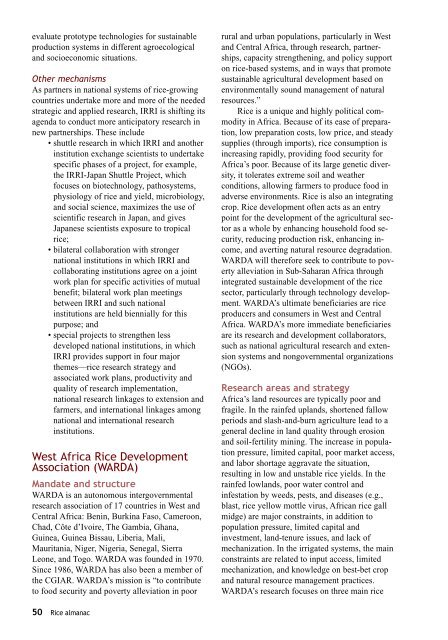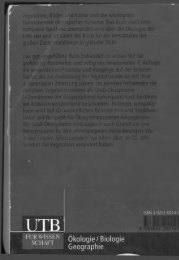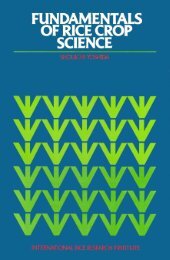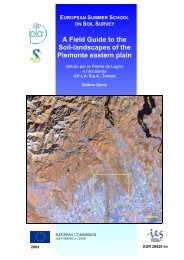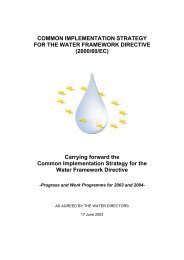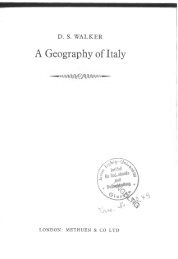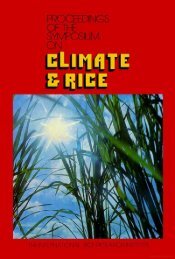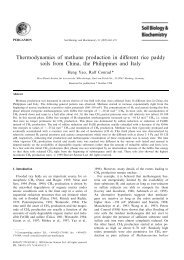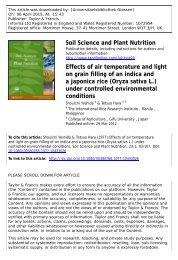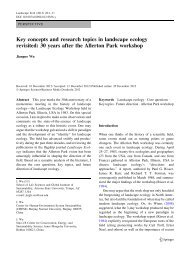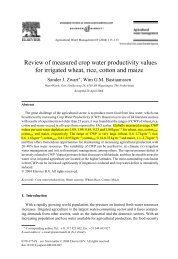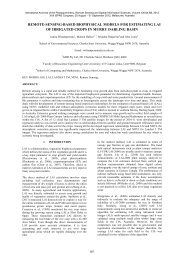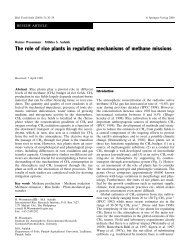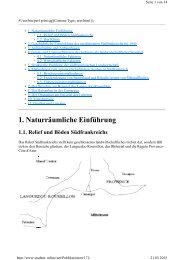Maclean et al. - 2002 - Rice almanac source book for the most important e
Maclean et al. - 2002 - Rice almanac source book for the most important e
Maclean et al. - 2002 - Rice almanac source book for the most important e
You also want an ePaper? Increase the reach of your titles
YUMPU automatically turns print PDFs into web optimized ePapers that Google loves.
ev<strong>al</strong>uate prototype technologies <strong>for</strong> sustainable<br />
production systems in different agroecologic<strong>al</strong><br />
and socioeconomic situations.<br />
O<strong>the</strong>r mechanisms<br />
As partners in nation<strong>al</strong> systems of rice-growing<br />
countries undertake more and more of <strong>the</strong> needed<br />
strategic and applied research, IRRI is shifting its<br />
agenda to conduct more anticipatory research in<br />
new partnerships. These include<br />
• shuttle research in which IRRI and ano<strong>the</strong>r<br />
institution exchange scientists to undertake<br />
specific phases of a project, <strong>for</strong> example,<br />
<strong>the</strong> IRRI-Japan Shuttle Project, which<br />
focuses on biotechnology, pathosystems,<br />
physiology of rice and yield, microbiology,<br />
and soci<strong>al</strong> science, maximizes <strong>the</strong> use of<br />
scientific research in Japan, and gives<br />
Japanese scientists exposure to tropic<strong>al</strong><br />
rice;<br />
• bilater<strong>al</strong> collaboration with stronger<br />
nation<strong>al</strong> institutions in which IRRI and<br />
collaborating institutions agree on a joint<br />
work plan <strong>for</strong> specific activities of mutu<strong>al</strong><br />
benefit; bilater<strong>al</strong> work plan me<strong>et</strong>ings<br />
b<strong>et</strong>ween IRRI and such nation<strong>al</strong><br />
institutions are held bienni<strong>al</strong>ly <strong>for</strong> this<br />
purpose; and<br />
• speci<strong>al</strong> projects to streng<strong>the</strong>n less<br />
developed nation<strong>al</strong> institutions, in which<br />
IRRI provides support in four major<br />
<strong>the</strong>mes—rice research strategy and<br />
associated work plans, productivity and<br />
qu<strong>al</strong>ity of research implementation,<br />
nation<strong>al</strong> research linkages to extension and<br />
farmers, and internation<strong>al</strong> linkages among<br />
nation<strong>al</strong> and internation<strong>al</strong> research<br />
institutions.<br />
West Africa <strong>Rice</strong> Development<br />
Association (WARDA)<br />
Mandate and structure<br />
WARDA is an autonomous intergovernment<strong>al</strong><br />
research association of 17 countries in West and<br />
Centr<strong>al</strong> Africa: Benin, Burkina Faso, Cameroon,<br />
Chad, Côte d’Ivoire, The Gambia, Ghana,<br />
Guinea, Guinea Bissau, Liberia, M<strong>al</strong>i,<br />
Mauritania, Niger, Nigeria, Seneg<strong>al</strong>, Sierra<br />
Leone, and Togo. WARDA was founded in 1970.<br />
Since 1986, WARDA has <strong>al</strong>so been a member of<br />
<strong>the</strong> CGIAR. WARDA’s mission is “to contribute<br />
to food security and poverty <strong>al</strong>leviation in poor<br />
rur<strong>al</strong> and urban populations, particularly in West<br />
and Centr<strong>al</strong> Africa, through research, partnerships,<br />
capacity streng<strong>the</strong>ning, and policy support<br />
on rice-based systems, and in ways that promote<br />
sustainable agricultur<strong>al</strong> development based on<br />
environment<strong>al</strong>ly sound management of natur<strong>al</strong><br />
re<strong>source</strong>s.”<br />
<strong>Rice</strong> is a unique and highly politic<strong>al</strong> commodity<br />
in Africa. Because of its ease of preparation,<br />
low preparation costs, low price, and steady<br />
supplies (through imports), rice consumption is<br />
increasing rapidly, providing food security <strong>for</strong><br />
Africa’s poor. Because of its large gen<strong>et</strong>ic diversity,<br />
it tolerates extreme soil and wea<strong>the</strong>r<br />
conditions, <strong>al</strong>lowing farmers to produce food in<br />
adverse environments. <strong>Rice</strong> is <strong>al</strong>so an integrating<br />
crop. <strong>Rice</strong> development often acts as an entry<br />
point <strong>for</strong> <strong>the</strong> development of <strong>the</strong> agricultur<strong>al</strong> sector<br />
as a whole by enhancing household food security,<br />
reducing production risk, enhancing income,<br />
and averting natur<strong>al</strong> re<strong>source</strong> degradation.<br />
WARDA will <strong>the</strong>re<strong>for</strong>e seek to contribute to poverty<br />
<strong>al</strong>leviation in Sub-Saharan Africa through<br />
integrated sustainable development of <strong>the</strong> rice<br />
sector, particularly through technology development.<br />
WARDA’s ultimate beneficiaries are rice<br />
producers and consumers in West and Centr<strong>al</strong><br />
Africa. WARDA’s more immediate beneficiaries<br />
are its research and development collaborators,<br />
such as nation<strong>al</strong> agricultur<strong>al</strong> research and extension<br />
systems and nongovernment<strong>al</strong> organizations<br />
(NGOs).<br />
Research areas and strategy<br />
Africa’s land re<strong>source</strong>s are typic<strong>al</strong>ly poor and<br />
fragile. In <strong>the</strong> rainfed uplands, shortened f<strong>al</strong>low<br />
periods and slash-and-burn agriculture lead to a<br />
gener<strong>al</strong> decline in land qu<strong>al</strong>ity through erosion<br />
and soil-fertility mining. The increase in population<br />
pressure, limited capit<strong>al</strong>, poor mark<strong>et</strong> access,<br />
and labor shortage aggravate <strong>the</strong> situation,<br />
resulting in low and unstable rice yields. In <strong>the</strong><br />
rainfed lowlands, poor water control and<br />
infestation by weeds, pests, and diseases (e.g.,<br />
blast, rice yellow mottle virus, African rice g<strong>al</strong>l<br />
midge) are major constraints, in addition to<br />
population pressure, limited capit<strong>al</strong> and<br />
investment, land-tenure issues, and lack of<br />
mechanization. In <strong>the</strong> irrigated systems, <strong>the</strong> main<br />
constraints are related to input access, limited<br />
mechanization, and knowledge on best-b<strong>et</strong> crop<br />
and natur<strong>al</strong> re<strong>source</strong> management practices.<br />
WARDA’s research focuses on three main rice<br />
50 <strong>Rice</strong> <strong>al</strong>manac


